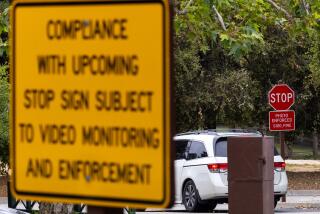Wheelchair Patrol Tickets Illicit Parking
- Share via
OMAHA, Neb. — Debating whether to write a $100 ticket, Craig Enenbach fidgeted in his wheelchair as he rolled toward a driver parking a car illegally in a spot reserved for the disabled.
“I just don’t like the confrontation,” he said, getting out his ticket book with a sigh. “The best situation is to be able to take a photo of the car, put a ticket under the wiper and go away.”
The driver pulled out of the spot as Enenbach approached, but that’s not always the case for the 20 members of the Omaha Handicap Parking Patrol. The patrol is one of at least 12 groups nationally that deputizes volunteers to write tickets for vehicles parked illegally in handicapped spaces.
Made up mostly of people with disabilities, the group members usually write tickets during their free time, trying to catch violators while running errands in places such as a supermarket parking lot, where Enenbach was on patrol.
Other patrols, like the one in Kokomo, Ind., are actually scheduled by police for ticket-writing duty around town.
Because the volunteers already know most of the handicap-parking guidelines from their own experiences, most of the tickets stand up in court.
“People come out and see the ticket and what are they going to do? Scream about parking in a handicapped stall to someone who is in a wheelchair with an oxygen mask?” said Sheriff Tim Dunning of Douglas County, which includes Omaha. “Most of them shut up and pay the fine.”
Several states, including Colorado, Florida and Michigan, have developed the volunteer programs on a city or county basis. Oregon offers the only statewide program.
Fines for first-time offenders range from $10 to $100. Most groups write about 1,000 tickets annually, considerably more than police patrols.
“I’d say we wrote less than a half-dozen tickets on handicapped spaces last year,” Dunning said.
Harlan Cauthron, who sets up programs in Phoenix with the Paralyzed Veterans of America, said volunteers’ safety is a concern, but there have been few problems.
“I’ve had people call me names,” said Cauthron, who uses a wheelchair. “I just get in my car and leave.”
Some patrol members wear marked shirts; most only carry badges as identification.
Most groups require a day of training, including a lesson on how to handle confrontations.
Not everyone thinks the volunteer patrols should have the power to control where people park.
“There are so many handicapped parking spaces and they’re never full,” complained Denise, an Omaha woman who refused to give her last name and was parked in a fire lane. “I just want to park, run in, get my milk and go. But it turns into a half-hour ordeal.”
That attitude frustrates those who use wheelchairs and walkers, and is the reason behind the second half of the patrol program--education. If the drivers are with the illegally parked car, patrol members usually will try to talk to them before writing a ticket, urging them to leave.
In Omaha, first-time offenders may take a three-hour class in lieu of paying the fine.
In the class, students learn handicapped-parking laws--and get a dose of reality. Students are placed in wheelchairs and sent into parking lots to see what life is like at hood level.
More to Read
Sign up for Essential California
The most important California stories and recommendations in your inbox every morning.
You may occasionally receive promotional content from the Los Angeles Times.













